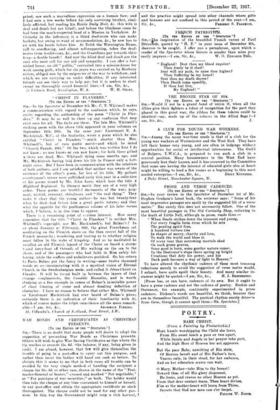"CHRIST IN FLANDERS."
Pro rat EDITOR or Tat ". SPECTATOR:1 SIR,—In the Spectator of December 8th Mr. C. T. Whitmell makes a communication with regard to the confusion which, he says, exists regarding the-authorship of the poem "Christ in Flan- ders." It may be as well to clear 1.p any confusion that may exist once for all. Tim facts are these. The late Mrs. Whitmell'e striking poem with the above title appeared in your columns on September 11th, 1915. In the same year Lieutenant E. A. Mackintosh, MC., of the Seafortits, wrote a poem which he also entitled " Christ in Flanders "—much shorter than Mrs. Whitmell's, but of rare poetic merit—and which he dated "Church Parade, 1915." Of the two, which was written first I do not know no one knows or can now know; for both these gifted welters are dead, Mrs. Whitmell dying sonic months ago, and Mr. Mackintosh haring laid down his life in Franco only a fort- night since. But I have been in communication with the relatives of both outliers, and I am satisfied that neither was aware of the existence of the other's poem, far less of its title. My gallant comitrytnen's verses were published early this year in a collection of his poems issued by Mr. John Lane, which bore the title A highland Regiment. In literary merit they are of a very high order. These poems are truthful documents of the war; poig- nant, wistful, reverent, chivalrous, and "the real thing." They make it clear that the young author—he was but twenty-four alien lie died—had before him a great poetic future; and they whet the appetite for the posthumous volume of his later verses width, I believe, is in due time to appear.
There is a remaining point of curious interest. How many remember that the title " Christ in Flanders" is neither Mrs. Whitmell's copyright, nor Mr. Mackintosh's, but Balzac's f In or about January or February, 16.11, the great Frenchman sat meditating on the Flemish shore on the then recent fall of the French monarchy; wandering and fearing ns to whether religion most follow in the wake of kingship. And as he meditated he recalled an old Flemish legend of the Christ on board a storm- tossed ferry-boat off Ostend; of His walking on the sea to the shore, and of the passengers who had faith in Him safely fol- lowing, while the scoffers and unbelievers perished. On his return to Thais 13alzac put the fancy in writing—seine twelve thousand words or so—incorporating with it a mystical vision of Eternal Church in the Swedenborgian mode, and called it Jesus-Christ en Flandrc. It will be foetid built in between the layers of that strange conglomerate, the Connidie Domaine, and is worth xtutlyiug as a fine example in cameo of Blame's inimitable power if clear limiting of scene and almost dazzling definition of character. I have no reason to believe that either Mrs. Whitman or Lieutenant Mackintosh had ever heard of Balzac's piece; certainly there is no indication of their familiarity with it; which of course makes the triple coincidence all the more remark-


























 Previous page
Previous page